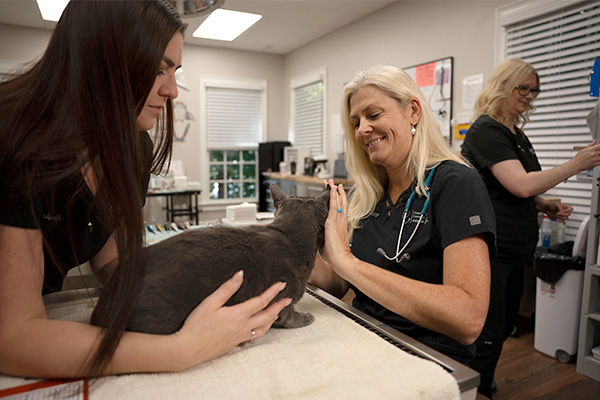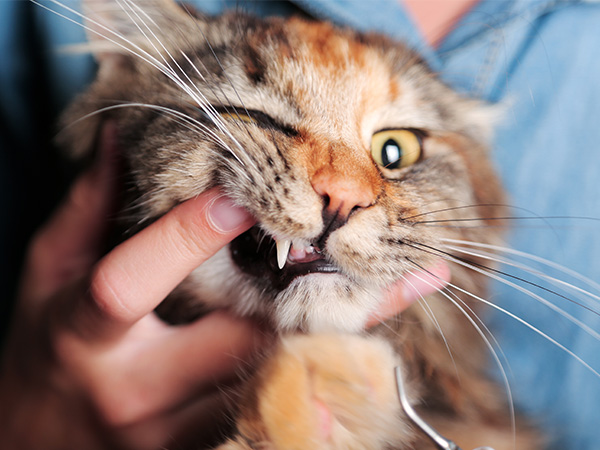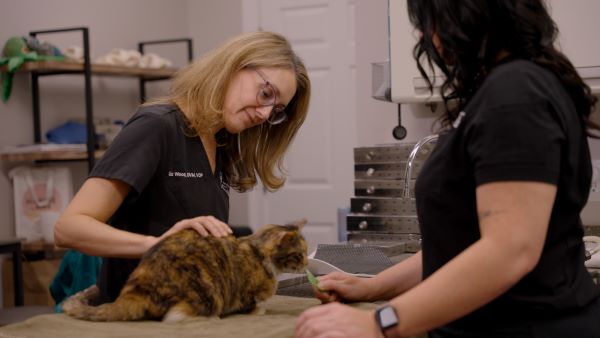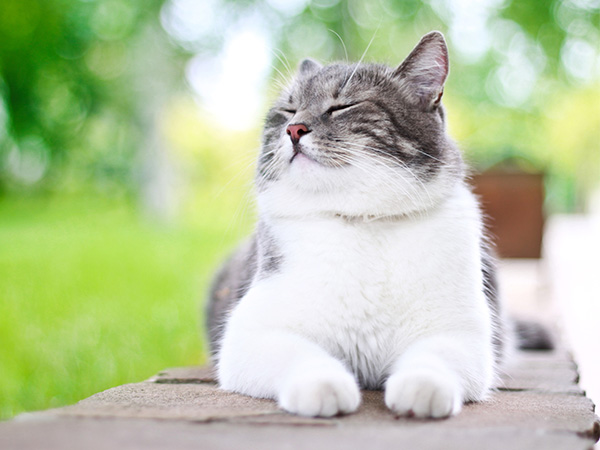Feline
Stomatitis
Inflammation in your cat’s mouth could point to a more serious issue characterized as feline or cat stomatitis. Here at Veterinary Dental Center of Atlanta, our veterinarians are equipped to diagnose the early signs of feline stomatitis and manage symptoms, protecting your cat’s comfort and quality of life.
What is Feline Stomatitis?
Feline stomatitis, also known as lymphocytic plasmacytic stomatitis, is a severe oral condition in cats, marked by widespread inflammation of the gums and mouth tissues. This disease can be extremely painful, making it difficult for your cat to eat and maintain proper oral hygiene.
Symptoms of Feline Stomatitis
Cats with stomatitis suffer from several distinct and painful symptoms that significantly impact their quality of life:
-
Severe Oral Inflammation
The gums, mouth, and throat can become red, swollen, and sometimes bleed.
-
Painful Ulcers
Ulcers may appear anywhere in the mouth, including the lips, tongue, and back of the throat.
-
Excessive Drooling
Often contains blood and is a sign of pain and discomfort.
-
Difficulty Eating
Cats may show an interest in food but then hesitate or withdraw due to oral pain.
-
Poor Oral Hygiene
As it becomes painful to groom, cats may develop matted fur and halitosis.
-
Behavior Changes
Increased irritability, decreased social interaction, and neglected grooming are common.
What Causes Stomatitis in Cats?
The exact cause of feline stomatitis is not fully understood, but several factors, including overall poor oral hygiene, contribute to its development:
-
Immune System Disorders
In many cases, the cat’s immune system overreacts to plaque around the teeth, leading to excessive inflammation.
-
Viral Infections
Conditions like feline calicivirus can predispose cats to develop stomatitis.
-
Genetic Predisposition
Some cats are genetically more susceptible to oral inflammations.
Feline Stomatitis Treatment
At VDCA, we employ a holistic approach to treating feline stomatitis, which may include:
-
1. Professional Dental Cleaning
Removing plaque and tartar can reduce oral irritation. This procedure is performed under anesthesia to ensure your cat’s comfort.
-
2. Tooth Extractions
Severely affected teeth may need to be removed to control the inflammation.
-
3. Medication Management
We may prescribe antibiotics, anti-inflammatory drugs, and pain relievers to manage infection and discomfort.
-
4. Laser Therapy
This modern treatment can reduce inflammation and promote healing of the oral tissues.
-
5. Nutritional Support
Switching to soft, high-calorie foods can help maintain your cat’s nutrition during recovery.
Effective treatment requires a combination of professional veterinary care and supportive home management:
- Comprehensive Dental Care: Initial treatments often involve thorough dental cleaning and possible tooth extractions to eliminate potential sources of irritation.
- Immunosuppressive Drugs: Medications like cyclosporine can be used to control the immune system’s overreaction.
- Antibiotics and Anti-inflammatory Medications: These help manage secondary infections and reduce inflammation.
- Laser Therapy: Helps in reducing pain and inflammation while promoting faster healing.
- Dietary Adjustments: Incorporating soft, nutritious foods to ease the pain of eating.
- Regular Follow-ups: Monitoring by a veterinarian to adjust treatments as necessary.
Prevention of Stomatitis in Cats
While stomatitis can be difficult to prevent entirely due to its unclear origins and connection to the immune system, some strategies can help reduce the risk or severity:
- Regular Veterinary Check-ups: Early detection and management of oral health issues can prevent the development of severe stomatitis.
- Good Oral Hygiene Practices: Regular brushing of your cat’s teeth and professional cleanings can help prevent plaque buildup that may trigger stomatitis in susceptible cats.
- Diet and Nutrition: Feeding a balanced diet that supports overall health can also support oral health.
- Manage Stress: Reducing stress in your cat’s environment helps maintain a strong immune system.
FAQs About Feline Stomatitis
Is stomatitis in cats contagious?
No, stomatitis itself is not contagious to other cats or humans. However, some underlying viral infections that contribute to stomatitis can be contagious among cats.
What should I feed a cat with stomatitis?
Opt for soft, easy-to-chew foods such as canned wet cat food, pureed baby food, or high-calorie nutritional gels. Ensure food is at room temperature to avoid discomfort.
How is stomatitis spread in cats?
Stomatitis isn’t spread directly but can be associated with contagious elements like feline calicivirus, which is transmissible among cats.
What are the options for pain relief for cats with stomatitis?
Pain management may include NSAIDs made for cats, opioids for severe pain (under veterinary supervision), and corticosteroids to reduce inflammation.
How long can a cat live with stomatitis?
With appropriate management and care, cats with stomatitis can lead a comfortable life for many years. Regular veterinary visits and treatment adjustments are crucial.
What is the difference between gingivitis and stomatitis in cats?
Gingivitis is inflammation limited to the gums and is usually less severe. Stomatitis is more extensive, affecting all soft tissues of the mouth, and is more difficult to manage.
A Path Toward Recovery
Dealing with feline stomatitis can be challenging, but with the right care and intervention, many cats go on to lead long comfortable lives. Our team at the Veterinary Dental Center of Atlanta is dedicated to providing the best care possible and is equipped with the knowledge and tools to treat this painful condition effectively.




